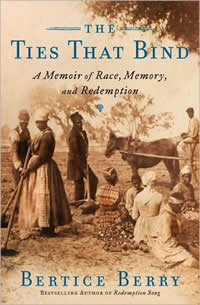Book Notes
 Bertice Berry, The Ties That Bind; A Memoir of Race, Memory, and Redemption (New York: Broadway Books, 2009), 205pp.
Bertice Berry, The Ties That Bind; A Memoir of Race, Memory, and Redemption (New York: Broadway Books, 2009), 205pp.
When Bertice Berry wrote her novel Redemption Song (2000) with fictionalized accounts of her family past, she named "the evil slave owner" with the real life name of the plantation owner under whom her family lived during that period. She had an underlying agenda in doing this: "By using his name, I was putting him on record, calling him on the carpet. I put him right up there on what could be considered the contemporary 'auction block' for all to see. I wanted slavery to be his shame, not mine or my ancestors'." Berry's great-grandfather, John Henry Freeman, lived and worked under this man, John Hunn.
Berry now regrets that decision. Through remembering conversations with her mother and by reading about slavery, she learned that John Hunn was anything but an evil slave owner. He was a Delaware Quaker minister and abolitionist and, as her mother had always insisted but she had refused to hear, a very good man. "John Hunn was not a slave owner. . . I discovered that John Hunn was the southernmost conductor of the Underground Railroad." Nor was her great-grandfather a slave; it appears that John Henry was a free man. In a quirk of fate, Berry first learned about her revised family history while sitting in a hospital room with her sick mother. After her mother went to sleep she changed the channel, and on a PBS documentary about abolition she learned the truth about John Hunn.
The historical past has for many blacks been a source of bondage, but in this memoir Berry turns it into a source of freedom. Physical bondage to slavery is bad enough, but psychological bondage to its after effects is even worse, she says. Berry came to realize how not all history or its actors are all black or white, how the oppressed can become the new oppressors, and victims the new victimizers. In fifteen simply written chapters Berry switches back and forth between her past and present. Both are painful reminders of the complex family legacies that resulted from slavery. Her story includes coming to grips with her mother's alcoholism, two rapes, and verbal and physical abuse. In fact, her mother gave birth to seven children by seven different men. Berry herself was raped, and twice divorced, but that has not stopped her from rising above her family history. She eventually earned a PhD in sociology and today is a motivational speaker. The road to redemption, she wisely observes, requires both repentance for false stereotypes and forgiveness for genuine wrongs.


